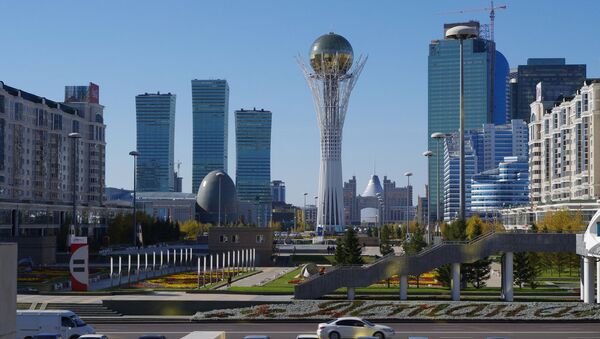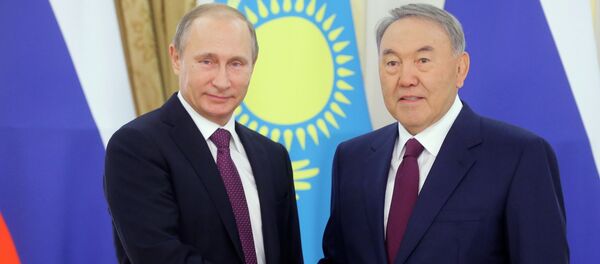The foreign ministers of 51 Asian and European countries met in Luxembourg for the 12th Asia-Europe Meeting (ASEM) on November 5-6. Kazakhstan’s delegation was headed by Volkov.
"In my speech at the ministerial meeting I emphasized that due to the stable political situation and a favorable geographical location, as well as the successful implementation of a number of transport and logistics infrastructure projects, Kazakhstan could become a bridge between Asia and Europe," he said.
According to the deputy minister, Kazakhstan has entered a new stage of development where priority attention is given to industry modernization and new technologies.
Volkov added that strengthening his country's partnership with industrialized nations was important, citing Kazakhstan's recent $23-billion in agreements with China to implement industrial projects.
The politician also pointed out that development of strategic and stable economic partnerships with Britain, Germany, France and other European states is important to the Central Asian country.
Some political forces use terrorist attacks to achieve their own goals, impeding an efficient international anti-terrorist fight, Kazakhstan’s Deputy Foreign Minister Alexei Volkov told Sputnik.
"Current events in the various regions of the world, including a series of terrorist attacks in the Middle East and in Paris, show that the lack of effectiveness in the fight against terrorist threats is largely explained by differences in the assessment of this threat, and sometimes, by the direct use of terrorist capabilities by some political forces," Volkov said.
He added that the difference between the states' approaches to the fight against terrorism "not only reduces the systematic work of the international community, but also allows 'terrorists internationally' to take advantage of differences between states."
During the 70th session of the UN General Assembly in September, Kazakh President Nursultan Nazarbayev called to create an international antiterrorist network under the aegis of the United Nations.
Astana invites European companies to establish joint ventures in Kazakhstan using the country as a foothold to expand into neighboring states, Deputy Foreign Minister Alexei Volkov said.
"Localization of production in our country will enable European companies to expand their presence not only in Kazakhstan, but also to successfully expand presence in markets of the Eurasian Economic Union (EEU), Southeast Asia and China, which also meets the strategic interests of all the countries involved in the process," the deputy minister said.
He added that joint ventures could be established in a wide range of fields, including engineering, the development of new industrial technologies in steel, chemical, mining and processing industries, pharmaceuticals, transportation, construction, agriculture, the food industry and tourism.
Astana will ease travelling restrictions for the citizens of a number of developed countries, Alexei Volkov said.
"We [Kazakhstan’s Foreign Ministry] currently are working on the simplification of a visa regime beginning on January 1, 2017, for the countries of the Organization for Economic Co-operation and Development (OECD), the United Arab Emirates, Malaysia, Singapore, Monaco," Volkov said.
He added that citizens of these counties will have visa-free entry to Kazakhstan and permission to stay in the country for up to 30 calendar days from their date of entry.
The measure is intended to foster the creation of an Astana International Financial Center by attracting foreign investment from countries with developed financial sectors, the deputy foreign minister observed.
Astana advocates stronger ties between the European Union and the Eurasian Economic Union (EEU) as potentially beneficial to all members of the two blocs, Alexei Volkov said.
"The establishment of trade and economic cooperation [of EEU] with the European Union could be very promising, which is particularly important in the current environment, in light of the difficulties experienced by the world economy," the deputy foreign minister of Kazakhstan, an EEU member, said.
According to Volkov, the interaction of the two integration associations has strong economic potential and all the necessary prerequisites of success: complementary economies, close proximity, and shared commitment to trade rules.
"It should be noted that such cooperation would be beneficial to all [countries] as it is directed at improving the welfare of their peoples," he said.
The EEU is an economic union of former Soviet republics, which comprises Armenia, Belarus, Kazakhstan, Kyrgyzstan and Russia.
Astana intends to complete the construction of a Beineu-Bozoi-Shymkent gas pipeline to China in 2017, Kazakhstan’s Deputy Foreign Minister said.
"The full completion of the construction of the project, taking into account the eight compressor stations, is slated for the end of 2017," Volkov said adding that the pipeline is expected to deliver 10 billion cubic meters of gas per year.
He added that the construction of the pipeline would facilitate delivery of Kazakhstan's gas to China, adding that the delivery is especially important since at the moment Kazakh gas is currently only exported to Russia.
Kazakhstan considers the fight against terrorism a priority in its international cooperation, Alexei Volkov stated.
"The fight against terrorism is one of the priority areas for international cooperation of Kazakhstan with a view to ensuring not only national security, but also to regional and global security,” Volkov said.
He added that Kazakhstan's president called on the UN General Assembly in September to form a broad coalition to counter terrorism under United Nations auspices, confirming a need for real synergies within the international community and a unified approach to assessing risk as well as effective mechanisms to deal with those risks.
“In the fight against terrorism and extremism Kazakhstan participates in all of the universal UN documents, including the UN Global Counterterrorism Strategy, as well as actively using the regional mechanisms in such well-respected organizations as the Commonwealth of Independent States (CIS), the Shanghai Cooperation Organisation (SCO), the Conference on Interaction and Confidence-Building Measures in Asia (CICA) and the Collective Security Treaty Organization (CSTO)," Volkov said.
The CSTO is a military alliance comprising Russia, Armenia, Belarus, Kazakhstan, Kyrgyzstan and Tajikistan. Its key objective is to fight "international terrorism and other nontraditional threats to security," according to its website.
The SCO is an international organization comprising Russia, China, Kazakhstan, Kyrgyzstan, Tajikistan and Uzbekistan.
The CIS is an association of ex-Soviet states, comprising Russia, Armenia, Azerbaijan, Belarus, Kazakhstan, Kyrgyzstan, Moldova, Tajikistan, Uzbekistan, Turkmenistan and Ukraine.
CICA, aiming at promoting peace, security and stability in Asia, has 26 full-fledged member states, while seven countries and four international organizations have observer status.
Some political forces use terrorist attacks to achieve their own goals, impeding an efficient international anti-terrorist fight, Kazakhstan’s Deputy Foreign Minister Alexei Volkov told Sputnik.
"Current events in the various regions of the world, including a series of terrorist attacks in the Middle East and in Paris, show that the lack of effectiveness in the fight against terrorist threats is largely explained by differences in the assessment of this threat, and sometimes, by the direct use of terrorist capabilities by some political forces," Volkov said.
He added that the difference between the states' approaches to the fight against terrorism "not only reduces the systematic work of the international community, but also allows 'terrorists internationally' to take advantage of differences between states."
During the 70th session of the UN General Assembly in September, Kazakh President Nursultan Nazarbayev called to create an international antiterrorist network under the aegis of the United Nations.
Russia remains a key partner of Kazakhstan in space exploration, Alexei Volkov said.
"Russia is the main strategic partner of Kazakhstan in the field of space-related activities. One of the main directions of our cooperation with Russia is an efficient use of the Baikonur space center," Volkov said, adding that since 1992 the two countries have signed over 50 agreements, including the creation of the KazSat telecommunication and broadcasting system and the Baiterek space launch complex.
Volkov added that France was another strategic partner of Kazakhstan in space, since Kazakhstan's Gharysh Sapary developed together with French Airbus Defence & Space such major projects as Kazakh Earth's remote sensing system and its spacecraft assembly and test facility in Astana.
Baiterek, which is being built at the Russia-leased Baikonur cosmodrome, is central to Kazakhstan’s ambitions to become a space power. According to Kazakh government officials cited by media in June, Baiterek construction at the Russian-leased Baikonur cosmodrome will begin in 2021.
Astana continues preparations for joining the Missile Technology Control Regime (MTCR), Alexei Volkov said.
The MTCR is a voluntary association of countries, which declare their commitment to non-proliferation of unmanned delivery systems capable of delivering weapons of mass destruction. The agreement regulates the transfer of technologies that can be used to build nuclear-capable missiles.
"The joining by Kazakhstan of the Missile Technology Control Regime (MTCR) is an important factor in the development of the national space activities and the participation of the republic in the international cooperation in the field of space," Volkov said.
He added that Kazakhstan met all the MTCR requirements to accede to international treaties on non-proliferation of weapons of mass destruction, adopted a package of regulations, ensuring effective export control of the missile systems, components and technologies.
"Currently work in this field is continuing," the deputy foreign minister pointed out.
Earlier, head of Kazkosmos Talgat Musabayev said that Kazakhstan's non-membership in MTCR creates problems with the transfer of missile technology to the country in joint space projects.





